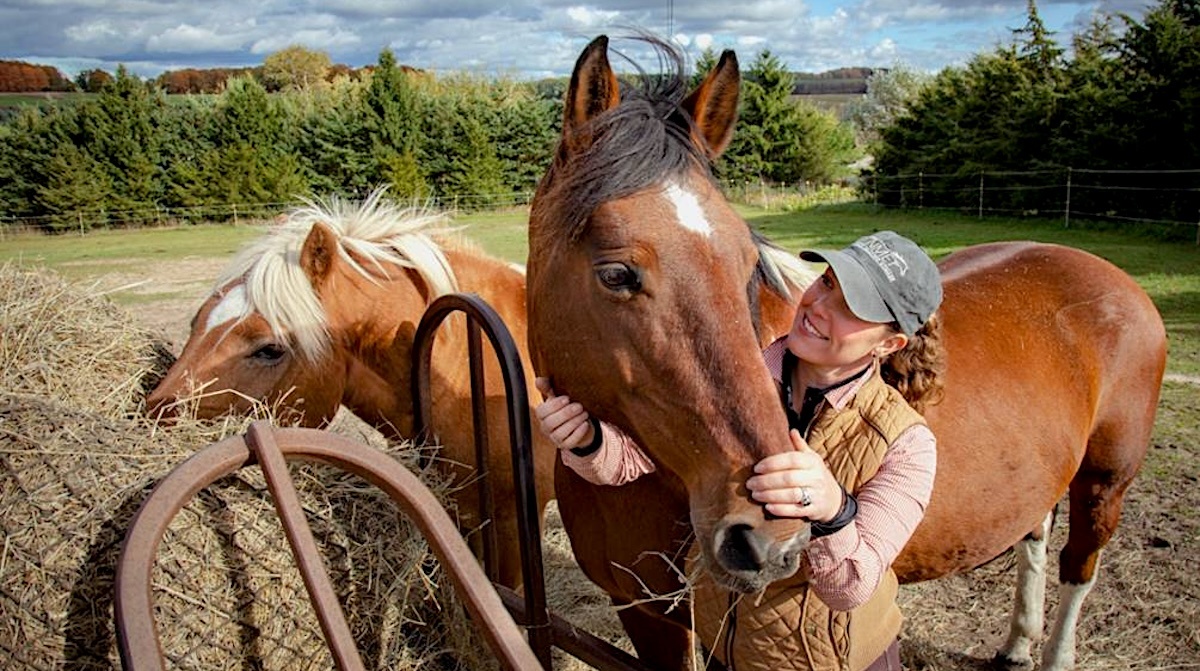
Getting Back in the Saddle with Equine Therapy
How horses can help with both physical and mental health
By Rachel Pasche | Sept. 13, 2025
It’s no secret that animals can help us in myriad ways; consider how uplifting it is when a dog approaches you and gently asks for a pet, or when a cat perches on your lap, purring. Two organizations in northern Michigan have taken that same concept and transformed it into something incredible: equine therapy.
Through seemingly simple activities like riding horses or spending time with them in the pasture, the clients served by these two organizations are overcoming obstacles with life-changing results.
Northern Michigan Equine Therapy: Boyne City
Courtney Sumpter has always loved being around horses; growing up in the Detroit area, her parents would drive her to riding lessons from a young age. After attending Western Michigan University, she felt the absence of horses in her life and looked for ways to get involved. She attended an orientation as a volunteer therapeutic riding instructor and fell in love with the practice of working with horses as a therapeutic tool.
Sumpter went on to receive her master’s and become an occupational therapist. “I really enjoyed working one-on-one with the patients, and the therapy sessions were really rewarding, but I wanted to incorporate the horses into the therapy, like I had experienced when I was volunteering,” Sumpter says.
She and another friend, also a therapist, started a program offering hippotherapy (equine-assisted occupational therapy) in the Detroit area, but Sumpter needed a change of pace and scenery.
She moved to Traverse City, where she worked at Munson Hospital. When a colleague heard about Sumpter’s previous experience with equine therapy, they asked if Sumpter would be willing to work with their son, who had autism. Sumpter agreed, and they rented out arena time so the boy could work with Sumpter and her horse, Tank. The boy made tremendous progress in his physical capabilities, and more people reached out after hearing of Sumpter’s work through word of mouth.
Fifteen years ago, Sumpter was able to buy her own farm and started Northern Michigan Equine Therapy (NMET) in Boyne City, where she began offering hippotherapy to treat a variety of disabilities and disorders. NMET has seen tremendous growth over the years and now completes over 1,000 sessions annually, helping patients from all over the state build their physical and mental strength.
The mission of NMET is to harness the healing powers of horses to improve lives. “Our purpose is to assist and strengthen what is needed for a more fulfilling and independent life,” Sumpter says.
On the physical side, riding a horse uses and strengthens a ton of muscles, often without the rider recognizing how much work their body is doing.
“Lots of kids and adults don’t realize they’re doing therapy because it’s fun; they’re sitting on a horse’s back, riding. The movement is training the brain for core stability and dynamic movement, and then they can utilize that movement in their everyday life skills,” Sumpter says.
One patient story that particularly resonated with Sumpter was that of a four-year-old boy with Pitt-Hopkins syndrome, a rare genetic disorder. His physician said he’d never be able to walk, and his mom brought him to NMET as a final effort, claiming nothing else was working for him. After several months of both occupational and hippotherapy therapy, the boy took his first steps on his fifth birthday after his horseback riding session. He still rides at NMET today and is working on conquering stairs so he won’t ever have to use a wheelchair again.
On the mental and emotional side, NMET also offers a mental health program, HorseSense®. This program focuses on interpersonal relationship skills, communication skills, and emotional support. Participants don’t ride the horses, but instead spend time with them in the pasture and learn elements of effective and kind communication required to establish a relationship with a horse.
Peace Ranch: Traverse City
Peace Ranch offers a different type of equine therapy: Trauma recovery.
Founders Jackie and Paul Kaschel found their way to equine therapy through necessity. After adopting three young sisters from a traumatic situation, the Kaschels sought a path to help the girls navigate and recover from their trauma. Both Jackie and Paul are licensed therapists, but none of the traditional techniques helped their girls.
They noticed a change when they decided to move to a farm; the farm chores and caring for the variety of animals on the farm helped the girls regulate. The horses, especially, seemed to bring peace to the girls.
Jackie researched Equine Assisted Psychotherapy, a new and experiential type of therapy that uses horses as therapists (of sorts) to help people navigate their emotions. The Kaschels decided to pursue the development of a space for this type of therapy, replacing their breeding stock with rehabilitated and rescued horses. In 2010, Peace Ranch was founded.
Peace Ranch now boasts over 850 clinical hours annually, serving patients of all ages, from young children to elderly veterans, helping people overcome trauma and other emotional issues they may face.
The organization operates on the Eagala model (Equine Assisted Growth and Learning Association), which means there is always a horse, an equine specialist, and a mental health professional for each session. The first group to visit Peace Ranch was a group of children, brought by a professional in child services who had previously participated in equine therapy. The kids, who had previously gone through multiple agencies and types of treatment, made tremendous progress with the horses in a short amount of time.
“The horse can be enough of an incentive to encourage adults and children to slow down, calm down, and enter a more serene mindset. The horse can tell when people are anxious and high-strung, and won’t approach people unless they’re calm and relaxed,” says Kim Walton, executive director of Peace Ranch. “Horses understand body language to a high degree; it’s part of living in a herd. All of that ties into promoting calmer mindsets, more relaxed nervous systems, and helping people overcome the trauma mindset that may guide their lives.”
At Peace Ranch, it’s all groundwork, no riding horses. Patients and horses are face-to-face and side-to-side out in a pasture, interacting with each other. Anyone trying to approach the horse has to self-regulate enough that the horse can sense they’re ready to be approached.
“It encourages people to really calm down and relax. It’s an actual physical reaction when people can self-regulate their nervous systems repeatedly; they sort of train themselves to depart from the reactive mindset and encourage their nervous system to calm down,” Walton says.
One especially remarkable success story is of a girl who had been kicked out of several high schools and was moving between agencies and programs. She came to Peace Ranch for a summer, doing intensive therapy. She rejoined high school, kept attending Peace Ranch for therapy sessions, and ended up graduating as the valedictorian of her class several years later. She now lives nearby with a family of her own.
Pictured: Courtney Sumpter with Tank; photo courtesy of Northern Michigan Equine Therapy
Trending

Our Top Stories of 2025
Each year, we look back at the stories we’ve shared over the last 12 months and pull together the ones that got the mo… Read More >>
A Solo Rattler
Frontman of folk-rock band Michigan Rattlers Graham Young brings his solo performance to Great Lakes Center for the Arts in … Read More >>
GTB Starting the Year with Tradition
The Grand Traverse Band of Ottawa and Chippewa Indians hosts the Kchi Wiikwedong Anishinaabek Maawnjidowin Round Dance on Ja… Read More >>


